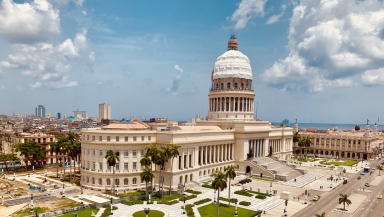
Imagine that you lived in a country where shortages of food and medicine were a daily reality; where electricity blackouts were becoming increasingly frequent due to poorly managed infrastructure; and where hundreds of thousands of people had felt they had – or in some cases literally been given – no other choice but to leave.
If you are a Christian, the first and most natural response would surely be to pray, perhaps at a church service or on social media, and you would almost certainly expect your priest or pastor to mention the state of the nation in their sermons or addresses.
But in Cuba, where all such issues are very much present and pressing, all of this would be forbidden. Because to pray about such problems, or to encourage others to do the same, is to acknowledge that they exist, and in the eyes of the government, to acknowledge that they exist is to criticise the authorities for their resolute failure to deal with them.
Of course, any group that might quite naturally want to go further still and take practical action to respond to the needs of their communities, such as distributing humanitarian aid or sharing food with the homeless – actions that one would not typically expect anyone of any religion or belief to take exception to – will find themselves similarly instructed to stop.
Last year, for example, one pastor who leads a registered church associated with the government-supported Cuban Council of Churches (CCC) in central Cuba was summoned by two State Security agents to the local Office of Religious Affairs (ORA) where he was questioned by three government officials who expressed concern that his church’s humanitarian work and ‘the images he was projecting abroad’ could be misinterpreted by ‘enemies of the Revolution’.
The officials initially asked the pastor politely to stop this work, claiming that it was the responsibility of the government and not churches. When the pastor refused he was threatened with the cancellation of his religious credentials, and while he was ultimately permitted to leave, he was warned that there would be ‘consequences’ for his actions.
And that’s just one case, affecting a registered church that would typically enjoy more freedom than the countless others the government has refused to register over the past six and a half decades.
In 2024 CSW documented 624 separate cases of violations of the right to freedom of religion or belief (FoRB) in Cuba. Almost all cases involved multiple types of violations, such as arbitrary detention, repeat interrogations, threats, harassment and fines, and religious groups of all types were affected.
Some children even experienced discrimination in schools because of their religious beliefs. One Protestant pastor told CSW that she was summoned to her child’s primary school by the school principal because they were carrying a Bible in their backpack. The principal warned the pastor that even though the child did not take the Bible out of their bag during school hours, if they ‘continued to cause problems’ she would have ‘no choice but to take more severe measures, including the possible expulsion of the student’.
In another case the teenage daughter of a Yoruba religious leader was ordered by her school principal to remove her idde, a colourful bracelet used as a protective amulet. When she refused to do so she was sent home and her parents were summoned to the school where they were warned that she would be expelled if she continued to wear the bracelet. Her father pointed out that his daughter was top of her class, but was nonetheless forced to reach a compromise that she would wear an amulet that would not be visible to her classmates.
It may be hard to fathom how such pettiness plays into the government’s wider crackdown on FoRB and other fundamental human rights, or how on earth it could justify extending its repression to children, but ultimately it all comes down to fear; fear that the spread of religious belief on the island could lead more people to question the supreme authority the Cuban Communist Party has worked so hard to establish, or that it may motivate them to respond to the dire humanitarian needs that have arisen from decades of mismanagement, and perhaps even to notice who is responsible for such mismanagement.
As long as that fear persists, it will continue to do everything in its power to stifle any and all perceived criticism of the government or its policies, which is exactly why those within the international community that are committed to human rights and democracy must in turn stand with and strengthen all those working to transform and improve the reality in Cuba today.
By CSW’s Press & Public Affairs Officer Ellis Heasley. Click here to read CSW’s new report on Cuba.













